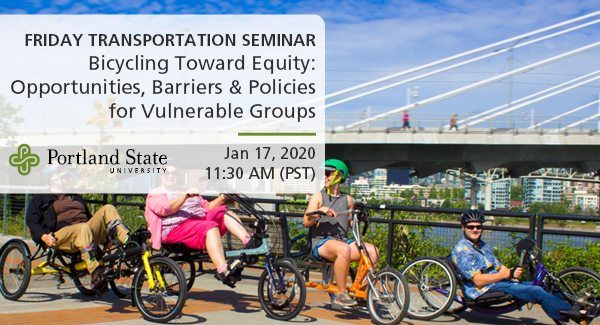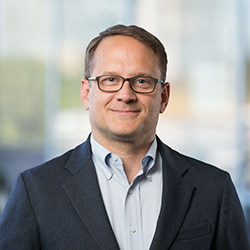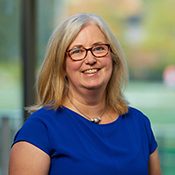
Friday Transportation Seminars at Portland State University have been a tradition since 2000. You can join us in person at 11:30 AM, or you can also watch online.
PRESENTATION ARCHIVE
- View Jennifer Dill's presentation slides (Women of Color on Two Wheels)
- View John MacArthur's presentation slides (Adaptive Bikeshare)
- Watch the video
THE TOPIC
This seminar will include two papers that will be presented earlier in the week at the Annual Meeting of the Transportation Research Board in Washington, DC.
Adaptive Bikeshare: Expanding Bikeshare to People with Disabilities and Older Adults
Bike share systems are expanding efforts to be more equitable and accessible to everyone by offering adaptive bicycle options to people who might otherwise be unable to ride. These systems tend to range from the inclusion of electric bikes and standard trikes into the existing systems to offering a more full-range of adaptive bicycle options for use at rental location. This presentation will document the current state of adaptive bike share as a concept and as a programmatic activity using several diverse primary data sources. Surveys of residents living in several low-income communities of color are used to explore the potential need for adaptive bike share options in urban locations. A national survey of cities and bike share operators is used to document the prevalence and basic models of adaptive bike share programming currently in place. Interviews conducted with bike share representatives in select cities with adaptive bike share programs provide context and details on how specific programs operate. Finally, interviews with adaptive bike share participants in Portland help to illuminate users’ experiences, including the perceived value and potential improvements for adaptive bike share. We found that there is an underserved market of people who do not feel they can use existing bike share systems because of some type of physical limitation but that reaching and serving those people presents substantial hurdles. Current bike share systems are slowly exploring the right way to include accessible options but are challenged by cost, resources, bicycle types, program implementation and infrastructure.
Bicycling and Bikeshare Among Women of Color in Three U.S. Cities: Barriers and Opportunities
Jennifer Dill, Portland State University
Bike share programs in the U.S. have been criticized because they have been used more by men, younger, white, and higher-income people. At the same time, most large U.S. cities experience a gender gap in bicycling. This presentation examines the barriers to and motivations for both bicycling and bike share use among women of color, using survey data from neighborhoods in Philadelphia, PA, Brooklyn, NY, and Chicago, IL. It will examine differences between women of color, white women, white men, and men of color to understand motivations and barriers. The research found that women of color were significantly less likely to ride a bicycle for transportation in the past week, have ridden a bicycle at all in the past 12 months, know how to ride a bicycle, be interested in bicycling more, have used bikeshare, or be a member of bikeshare compared to most groups. The differences persisted even after controlling for income, age, education, bicycle ownership, and knowing how to ride a bike, confirming the need to consider the intersection of race and gender when examining bicycling behavior. The presentation will examine the factors that help explain these differences and the opportunities for practice.
SPEAKERS
 John MacArthur is the Principal Investigator for TREC's electric bicycle research initiatives. His research also includes low-/no-emission vehicle infrastructure in Portland metro, as well as a climate change impact assessment for surface transportation in the Pacific Northwest and Alaska. Before joining the TREC staff, John was the Context Sensitive and Sustainable Solutions Program Manager for the Oregon Department of Transportation’s OTIA III State Bridge Delivery Program.
John MacArthur is the Principal Investigator for TREC's electric bicycle research initiatives. His research also includes low-/no-emission vehicle infrastructure in Portland metro, as well as a climate change impact assessment for surface transportation in the Pacific Northwest and Alaska. Before joining the TREC staff, John was the Context Sensitive and Sustainable Solutions Program Manager for the Oregon Department of Transportation’s OTIA III State Bridge Delivery Program.
 Jennifer Dill is a professor of Urban Studies and Planning at Portland State University, and director of TREC, PSU’s Transportation Research and Education Center. She is also the director of the National Institute for Transportation and Communities (NITC). Her research aims to understand people’s everyday travel decisions, with a focus on bicycling, walking, and transit. Dr. Dill is an internationally cited researcher on sustainable transportation. Among her research projects are Lessons from the Green Lanes: Evaluating Protected Bike Lanes in the U.S., Understanding Types of Cyclists Nationally, Pedestrian Observation and Data Collection Curriculum and more.
Jennifer Dill is a professor of Urban Studies and Planning at Portland State University, and director of TREC, PSU’s Transportation Research and Education Center. She is also the director of the National Institute for Transportation and Communities (NITC). Her research aims to understand people’s everyday travel decisions, with a focus on bicycling, walking, and transit. Dr. Dill is an internationally cited researcher on sustainable transportation. Among her research projects are Lessons from the Green Lanes: Evaluating Protected Bike Lanes in the U.S., Understanding Types of Cyclists Nationally, Pedestrian Observation and Data Collection Curriculum and more.
PROFESSIONAL DEVELOPMENT
This 60-minute seminar is eligible for 1 hour of professional development credit for AICP (see our provider summary). You will receive an electronic attendance certificate for other types of certification maintenance, in your follow-up email 24 hours after the broadcast.
LEARN MORE
Photo credit: BikeTown
Sign up for our newsletter to receive monthly updates.
Read about PSU's extensive research into bike share equity.
The Transportation Research and Education Center (TREC) at Portland State University is home to the National Institute for Transportation and Communities (NITC), the Initiative for Bicycle and Pedestrian Innovation (IBPI), and other transportation programs. TREC produces research and tools for transportation decision makers, develops K-12 curriculum to expand the diversity and capacity of the workforce, and engages students and professionals through education.
